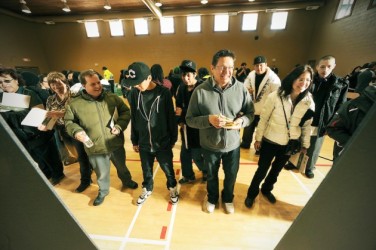Article Origin
Volume
Issue
Year
Quinn Crawler has deep roots in the Stoney community and can speak of a time when there was unity on the nation. In the 1970s, tribal leadership was under Chief Sitting Winds, Frank Kaquitts, the first and only chief of all three Stoney bands and his 12 councillors. No distinction was made between the Bearspaw, Chiniki and Wesley bands that make up the Stoney Nakoda Nation.
“You said you were Stoney,” said Crawler, a member of the newly formed Nakoda Wahtijabi (Youth) Advisory Council. The youth council also makes no distinction between the Bearspaw, Chiniki and Wesley bands.
Members between the ages of 14 and 35 years can join the youth council. According to the terms of reference, the council “operates as an ad hoc committee of volunteers and concerned citizens from the youth and young adult population of the three Nations to discuss issues pertaining to the Nation, its operation, its business/finances and its political affairs.” The six board members of the council aim to bring the concerns of the people to the Stony Tribal Council.
The issues facing the nation, said Crawler, originate with a clash between two entities, old school vision and new school perspective.
“There is trouble to integrate both entities, white man’s policy way and Native culture’s tribal customs,” said Crawler.
Language, he said, is a barrier between non-Native and First Nations people and between youth and the older generation. Some youth understand and speak the traditional language, while others understand but can’t speak it. In meetings to address youth concerns, young people who neither speak nor understand Nakoda-Sioux walk out.
Said Crawler, “Elders that speak English fluently can use it to explain to other Elders to get the point across; they could explain in the traditional language and then translate.”
Elder Virgle Stephens agrees that a key issue is the loss of language. “Today’s youth, some understand the language and don’t want to speak it.”
Stephens cannot emphasize enough the need to teach tribal customs to the younger generation.
Said Crawler, “Along with the loss of language is a loss of values.”
“(The youth council) wants to give voice back to the people, because power belongs to the people,” said Jolie Crawler, also a council member. “The majority of the community are unaware and rely on rumours and hearsay.”
“The community expects the chief to lead, to let people know how they work with the federal and provincial governments,” said Stephens. Traditionally, the chief would visit people in their homes. Elders would discuss and decide what was best for the people and put these ideas forward to the chief. “Rather than running it their way, the chief would listen to and stand up for the people.”
- 3029 views

